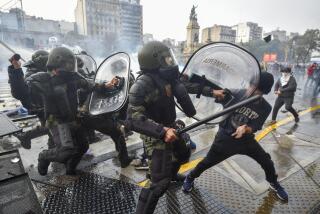Marcos Election Plan Goes to Parliament
- Share via
MANILA — The Philippine Parliament today takes up President Ferdinand E. Marcos’ bill for early presidential elections in January, with skeptical opposition leaders wondering whether he still has a card or two up his sleeve.
With just three weeks remaining before the bill’s Dec. 2 deadline for candidates to file, the opposition is fighting on two fronts:
--The president’s opponents will try to win parliamentary changes in the election plan, including a possible delay. Another parliamentary goal is accreditation of a civilian poll-watching organization.
--Marcos’ political foes also are in the midst of an intramural struggle to field a single candidate for president. There is only an outside chance of settling that contest this week.
An example of the two-front challenge facing the opposition occurred over the weekend within the Liberal Party wing headed by former Sen. Eva Estrada Kalaw. The 64-year-old Kalaw was named as her wing’s presidential nominee, joining former Sen. Salvador Laurel of the United Nationalist Democratic Organization (UNIDO) as a declared opposition candidate.
But even while accepting the nomination, Kalaw questioned the legality of the election plan. “We believe that Mr. Marcos’ position cannot pass the test of constitutionality,” she said. “How can he hold an election for a position that is not vacant nor expired?”
She was referring to the Marcos plan, disclosed Friday, to resign to create a vacancy in the presidency more than a year before his term expires, but to withhold the effectiveness of the resignation until after the election, in which he could win a new six-year term.
Like Post-Dated Check
The resignation is one of the presidential cards that troubles the opposition. Former Sen. Jovito Salonga, who heads the other wing of the Liberal Party, said: “A post-dated resignation is like a post-dated check. It is subject to a stop-payment order, and it can be dishonored by the issuer.”
Another now-you-see-it, now-you-don’t card is the position of the vice presidency. In calling for early elections a week ago, the president said “it is Marcos” that is at issue and that there would be no vice presidential race.
The opposition assailed the decision, arguing that a vice president is needed (there has been none since 1972) to assure an orderly succession should a president die in office.
Two days later, the president reversed himself and said there would be a second spot on the ticket. That presented a problem for the opposition front-runners, Laurel and Corazon Aquino--the latter an undeclared candidate. She is the widow of former Sen. Benigno S. Aquino Jr., once Marcos’ primary political foe, who was assassinated in August, 1983.
Most political analysts here say a ticket with Laurel and Aquino would present Marcos with his most serious challenge, but neither Laurel nor Aquino appears interested in the second spot.
Meanwhile, with the opposition wondering what would come next, Marcos continued to control events from Malacanang Palace. The government television channel produced a barrage of film showing Marcos or his wife, Imelda, promising aid to typhoon-stricken rice farms, accepting surrenders of insurgents and hobnobbing with visiting Russians during weeklong observances here of the Philippine-Soviet Friendship Society.
At almost every political turn during the week, ordinary Filipinos would tap their heads and say: “The man is clever. He’s got it up here.”
More to Read
Sign up for Essential California
The most important California stories and recommendations in your inbox every morning.
You may occasionally receive promotional content from the Los Angeles Times.













